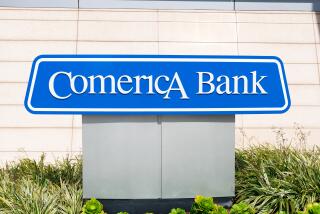Bank Plus Seeking Arbitration With First Alliance Over Debt
- Share via
Two Southern California lenders are squabbling over who should pick up the pieces of a failed credit card program that had allowed consumers to deduct interest charges on their income taxes.
Bank Plus Corp. in Los Angeles said Friday it is seeking an arbitration order to force First Alliance Corp., an Irvine mortgage lender specializing in borrowers with bad credit, to repurchase a $17.3-million portfolio of debt or find another buyer.
First Alliance once had high hopes for the novel credit card program it launched in 1997. The cards were issued to about 4,500 homeowners, who agreed to use the equity in their properties as security for the credit card debts.
But the program collapsed in December 1998, following a dispute between First Alliance and Bank Plus, which was issuing the cards, according to Francisco Nebot, president of First Alliance.
Now both sides are fighting over who should be required to take control of the remaining portfolio.
First Alliance has been searching for a buyer for several months, but the company says it should not be required to buy the debt itself. “Our outside counsel is telling us we don’t have that obligation,” Nebot said.
The companies also faced off last month in Orange County Superior Court over a $2.7 million reserve account, currently controlled by Bank Plus, parent of Fidelity Federal Bank. First Alliance lost a bid to take control of the money, but won assurances that Bank Plus would not seize the money, Nebot said.
Meanwhile, delinquency rates on the cards, which were targeted at homeowners with credit problems, have been higher than expected, hitting about 14% in January, Nebot said. Actual losses, however, are much lower because the debts are secured by real estate, so most borrowers repay rather than risk losing their homes.
Cardholders should not be affected by the battle, officials said. Many consumers were attracted to the cards by the opportunity to deduct the interest on their charges. Though the tax deduction for credit cards was eliminated in 1987, interest on the First Alliance credit cards could be deducted because the debts were secured by real estate, similar to a home equity loan.
Ironically, Bank Plus Chief Executive Mark Mason had been chief financial officer at First Alliance and had helped develop the credit card product that now divides the two companies. Mason resigned from First Alliance and joined Bank Plus in May 1998.
The court fight is the latest in a series of legal struggles that have consumed First Alliance in recent years. The lender, which is controlled by founder and chairman Brian Chisick, also faces numerous lawsuits and government inquiries related to its lending practices. The company’s stock has plummeted from $20 a share in late 1997 to $2.06 on Friday, down 38 cents in Nasdaq trading.
Bank Plus has had its own share of problems. An ill-fated expansion into high-risk credit card lending led to losses last year and tighter regulatory scrutiny.
“We made a strategic decision to exit the credit card business,” said spokesman Neil Osborne.
Stock in Bank Plus, which traded at $16 a share in 1998, closed Friday at $2.44, unchanged in Nasdaq trading.
More to Read
Inside the business of entertainment
The Wide Shot brings you news, analysis and insights on everything from streaming wars to production — and what it all means for the future.
You may occasionally receive promotional content from the Los Angeles Times.










